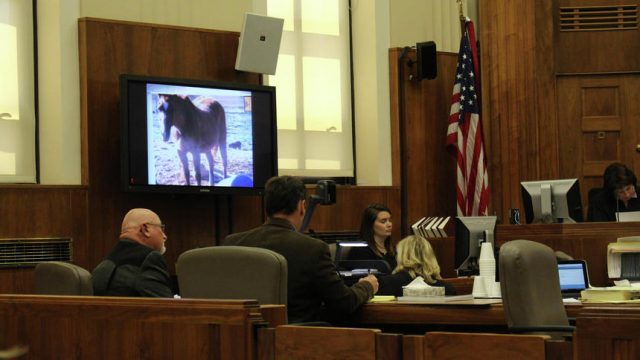How Can the State Seize Property Without Due Process?

In Stark County a local rancher is faces several felony and misdemeanor charges related to the alleged mistreatment of his cattle and horses.
I don’t know much about the specific facts of those charges against this gentleman. I don’t know if he has mistreated his animals or not. I can say, however, that there is something deeply troubling about the way the process surrounding these charges is playing out.
The rancher – Gerald “Gary” Dassinger of Gladstone – had to get a restraining order to stop law enforcement officials from loading up his animals and trucking them away. A judge agreed to issue the order, and hold a hearing about the seizure of the animals, but the problem is that no such hearing is required by law:
The hearing, the judge explained, was not required by state law. In North Dakota, law enforcement can petition the court for an order to seize animals and to dispose of the animals. Ehlis said she and attorneys in the case agreed to hold a hearing in order to preserve Dassinger’s due process rights.
Warren Zenker, president of the North Dakota Stockmen’s Association, says his group sent a letter expressing concern about whether Dassinger had been able to stand up for himself before his property was seized.
“That was a concern to us,” he says.
The 5th amendment states, “No person shall… be deprived of life, liberty, or property, without due process of law.”
Law enforcement and the courts getting together to decide to take some citizen’s property without giving that citizen an opportunity to defend themselves is not due process. And while Mr. Dassinger is getting a hearing, we shouldn’t have to rely on the forebearance of judges to ensure it happens.
Beyond the constitutional concerns, there are practical problems with the status quo as well as North Dakota Farm Bureau President Daryl Lies points out:
It’s the lack of a guilty finding that concerns North Dakota Farm Bureau President Daryl Lies. Dassinger’s animals were to set be seized before he even had been charged with a crime, Lies pointed out. And if his animals are taken and sold or otherwise disposed of and he’s later found not guilty of a crime, Lies questions whether the law did what it was supposed to do.
“There’s very little recourse” for livestock producers, he says.
Can you imagine losing valuable property – in this instance literally the livelihood of this rancher – because the state took it on the assumption you were guilty of something you were later acquitted of?
The state’s new animal cruelty laws, passed in 2013, are also a factor in this. One of the charges Dassinger faces, a felony, is related to his alleged failure to secure veterinary treatment for his animals. Does that mean every livestock owner in the state is a potential felon if they try to treat their animals themselves?
“That should be concerning to every livestock producer, every livestock owner in the state,” Lies says.
He’s right.
Whatever happens in Mr. Dassinger’s case, it’s clear the law needs some reform in this area. Protections against animal cruelty are one thing, but those protections cannot come at the expense of constitutional protections or good sense.




